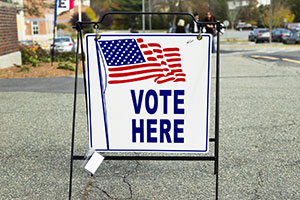An attorney for the ACLU has questioned the credibility and qualifications of the voting fraud expert called to testify in the suit against Kansas Secretary of State Kris Kobach. Kobach is being sued by several Kansas residents who were not allowed to vote because of a Kansas law that requires proof of citizenship. According to the ACLU, “Between 2013-2016, the law blocked more than 17,000 Kansans from registering to vote through the DMV – and a total of more than 35,000 Kansans from registering to vote through any means.”
Voting Fraud Expert
Hans von Spakovsky was called as a voting fraud expert. He testified that noncitizen voter registration is a substantial issue and in support of a Kansas law that requires voters to provide proof of citizenship. Von Spakovsky pointed to cases in Kansas and hundreds of allegations of noncitizens on the voter rolls that date back to the 1980s.
Hans von Spakovsky is a senior fellow at the Heritage Foundation and has written a book on voter fraud called Who’s Counting?: How Fraudsters and Bureaucrats Put Your Vote at Risk. Von Spakovsky opined that using other methods to identify non-citizens would be insufficient because they would be unable to identify illegal immigrants. Von Spakovsky warned that the possibility of being prosecuted for voter fraud does not deter voting by non-citizens because the United States essentially uses “an honor system” for its elections.
ACLU Challenge
The ACLU challenged von Spakovsky on his qualifications and credibility as an expert. Von Spakovsky’s resume includes serving along with the Kansas secretary of state on the commission on voter fraud that President Donald Trump set up, but has subsequently been disbanded. Von Spakovsky also worked for the U.S. Department of Justice during President George W. Bush’s first term.
The Director of the ACLU’s voting rights project, Dale Ho, asked von Spakovsky whether the research for his book, Who’s Counting?: How Fraudsters and Bureaucrats Put Your Vote at Risk had been peer-reviewed. Von Spakovsky responded that he is not an academic, so he does not use the peer-review process. Ho questioned von Spakovsky about his expert report, his understanding of voter fraud in Kansas, and his knowledge of specific instances of alleged fraud. Under Ho’s questioning, von Spakovsky admitted that his understanding of voter fraud in Kansas came from a spreadsheet that had been prepared by Kobach’s office.
Ho also questioned von Spakovsky about and email that he wrote in early 2017 that expressed his concern with President Trump’s decision to make the voter fraud commission bipartisan. Von Spakovsky wrote, “There isn’t a single Democratic official that will do anything other than obstruct any investigation of voter fraud.” Ho played an audio recording of Von Spakovsky denying sending the email or being concerned with its bipartisan nature. Von Spakovsky responded that the attorney was mischaracterizing his answers. He explained that the reporters were asking whether he had sent an email to Jeff Sessions and that he had truthfully responded no. “I was answering truthfully. I was simply asked in essence if I sent an email to Jeff Sessions. The answer was no. It was no at the time. It is no today. . . . The lawyer that I had sent it to, who as I said didn’t work for the federal government then, doesn’t work for the federal government now, unbeknownst to me, he sent it to the attorney general.”




